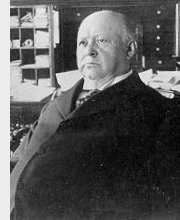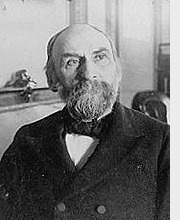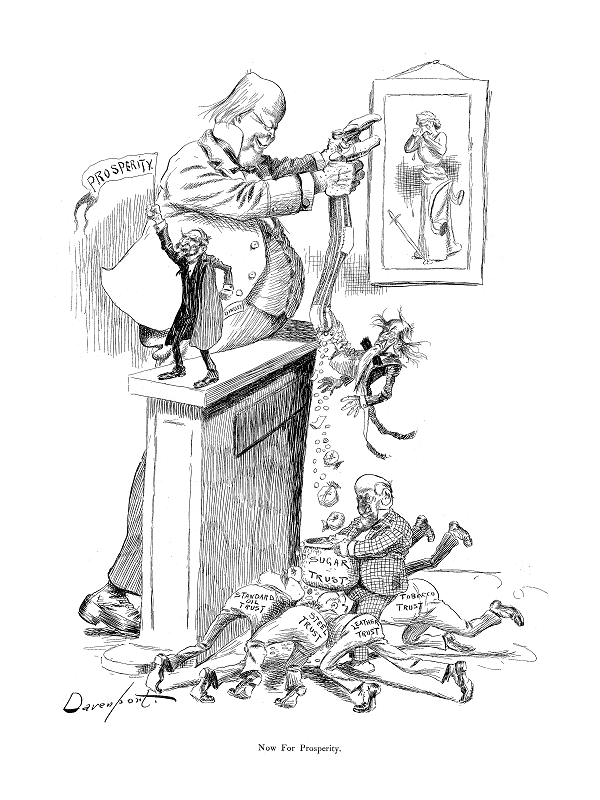Annotated Cartoons by Davenport
| Now For Prosperity The Dingley Tariff | ||
The Dingley Act of 1897, introduced by U.S. Representative Nelson Dingley, Jr. of Maine (shown here waving the flag of “Prosperity” while Republican House Speaker Thomas Reed dumps out Uncle Sam’s loose change for the scrambling special interests of the various “Trusts”), raised tariffs in United States to counteract the Wilson-Gorman Tariff Act of 1894, which had lowered rates. The Revenue Act or Wilson-Gorman tariff of 1894 slightly reduced the U.S. tariff rates from the numbers set in the 1890 McKinley tariff. It is named for William L. Wilson, Representative from West Virginia, chair of the U.S. House Ways and Means Committee, and Senator Arthur P. Gorman of Maryland. The Revenue Act or Wilson-Gorman tariff of 1894 slightly reduced the U.S. tariff rates from the numbers set in the 1890 McKinley tariff. It is named for William L. Wilson, Representative from West Virginia, chair of the U.S. House Ways and Means Committee, and Senator Arthur P. Gorman of Maryland.Supported by the Democrats, this attempt at tariff reform was important because it imposed an income tax of two per cent to make up for revenue that would be lost by tariff reductions. The bill introduced by Wilson and passed by the House would have made significant reforms. However, by the time the bill passed the Senate, it had more than 600 amendments attached which nullified most of the reforms.  President Grover Cleveland, who had campaigned on tariff reform and supported Wilson’s version of the bill, declined to actively support Gorman’s revision, although he allowed the bill to become law without his signature, believing that it was better than nothing and was at the least an improvement over the McKinley tariff. President Grover Cleveland, who had campaigned on tariff reform and supported Wilson’s version of the bill, declined to actively support Gorman’s revision, although he allowed the bill to become law without his signature, believing that it was better than nothing and was at the least an improvement over the McKinley tariff.Under the flattering tariff of the Dingley Act, rates reached a new high, averaging 46.5%, and in some cases up to 57%. The new Republican President William McKinley fully supported the bill. The Dingley Act remained in effect until the Payne-Aldrich Tariff Act of 1909. The income tax provision was struck down in the U.S. Supreme Court case Pollock v. Farmers’ Loan & Trust Company (157 US 428 1895). Ultimately, the 16th Amendment made the income tax constitutional when it was finally ratified in 1913. From Wikipedia, the free encyclopedia. |
 | |